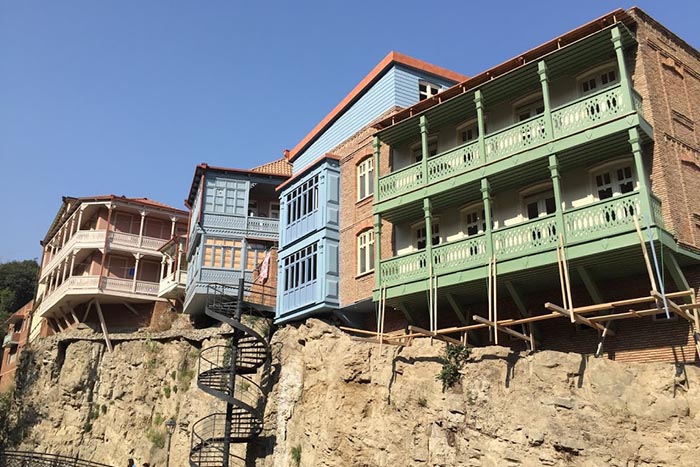Home in Tbilisi

There are cities one wants to revisit, cities one wants spend time in, cities that one would never want to set foot in again and then there is Tbilisi.
I have visited hundreds of places over the years, and feel comfortable in many places around the world. I am often asked which my favourite country is, and that is a difficult one to answer. Answering which my favourite city is is far easier, it is Tbilisi.
My definition of urban comfort is being able to step on public transport without question, to remember a short cut and to have a favourite restaurant. Even if it has transmogrified from a magnificent Indian joint to a Fusion Afghan specialist place; it is the memories.
It is having a little money left over from the last visit on a transit card or a nearly complete loyalty card from a coffee chain; it is the feeling of being allowed to avoid the major tourist sights because you have already seen them, and a morning spent wandering through a back-water is much more fun.
It is also in one’s mind; the sensation one gets in recognising a minor landmark, perhaps a tyre store on the way from the airport, perhaps anticipating a turn in the road, or perhaps the allure of a particularly garish building. The feeling of security and comfort in a distant land is embracing and unusual.
Tbilisi does it for me. From the road from the airport, past familiar landmarks, the first glimpse of an Orthodox Church stand proudly on the skyline, the first glance of the city’s magnificent river banks and the first wander through the old andcrumblingOld Town
Tbilisi is fabulous, and really should be on everyone’s bucket list. It is a bustling centre, flanking the banks of the Kura River, with a cornucopia of designs. Visions of the 19th century are visible throughout the Old Centre, some restored, some flaking slowly into dust; the patina of these old buildings, with magnificent, faded artwork in their lobbies and cracks reminiscent of earthquake damage. Now, earthquakes do hit the Caucuses, most recently in 2012, but the cracks look more due to inattention and gradual slippage; lovely, nonetheless.
Then there are rings of Soviet Concretism, heroic metalwork and apartment blocks so precarious and ugly, one wonders who could possibly have designed them. Interspersed are some of the most delightful contemporary buildings one could wish for.
Miss Haversham meets Renzo Piano.
Wandering, today, through the city was wonderful. The weather bright and warm, the streets bustling, 22 Bestiki Street still forbidding, and the restoration work of the city centre coming along delightfully. Walk back a block from the main drags and you are among crumbling buildings, small parks filled with laughing children, old buildings taken over by modern art and photography galleries, delightful little restaurants, very private offices and many residential apartments; truly a mosaic of people and function that seems to work so well.
No I don’t have such rose-tinted glasses that I can’t see the poverty that some people live in, but I am sure that there is a difference between being poor and living in poverty. There are terrible issues, of course; unemployment, pensions insufficient to provide even a basic living, the growing gulf between the wealthy who have been involved in development and those who have not.
However, there is also a burgeoning middle class; there are shops and other services clearly catering to their needs, and one huge change that I have seen in the eight years since I first visited, is the growth in infrastructure. From roads to railways, the country has invested in the backbone that will support growth, and allow the money in the country to flow more comprehensively than in most post-Soviet economies.
It is also worth remembering that as recently as the mid-1990s Tbilisi residents were burning furniture to provide some heat and some cooking fuel; there was little if any electricity and the country had submerged under the weight of endemic corruption. There was simply nothing here. Their growth has stemmed from a revolution in 2003 (only ten years ago) that brought post-Soviet power to an end. With ample assistance from both the USA and Europe, both to attempt to create a western state on Russia’s southern border, and a government committed to eliminating corruption and building wealth, the country has changed beyond recognition in many, many ways.
However, it is still Georgia, and it is still Tbilisi; coming back feels warm, welcoming and makes me wish that I had visited earlier in my life. I am sure that I would have moved here.
